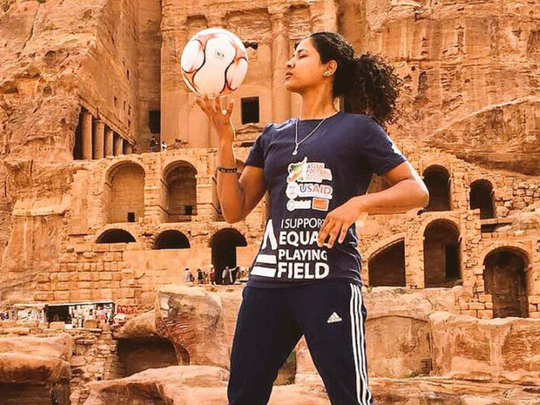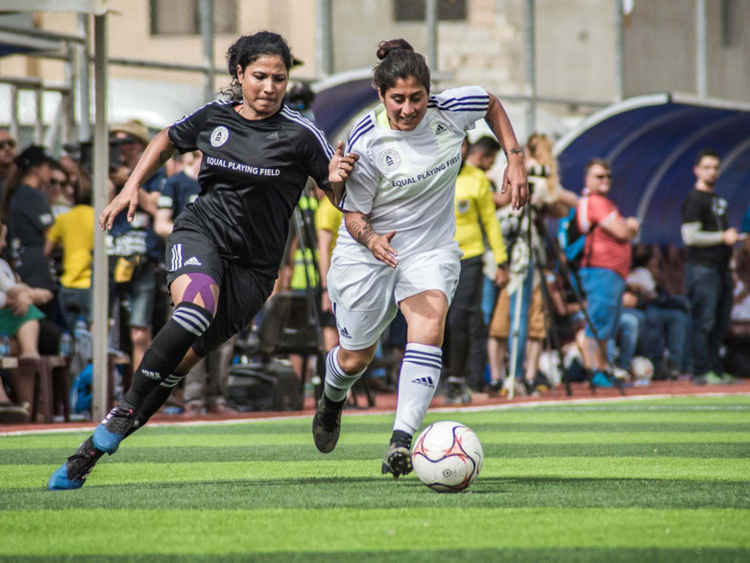
Islamabad: Here football is the passion of the people. It comes as no surprise that Hajra Khan first played outside her home with other children, keeping goal in a net chalked out against a neighbouring wall. However, it was not until she was 14, preoccupied with basketball and track and field, that her mother came across football tryouts in the local Sunday paper and told her to give it a shot.
Ten years on, Khan’s talent has forced football to transcend Pakistan’s gender norms and has proved to be a vehicle for change. Khan was made captain of the Pakistan women’s team at the age of 20. She is the country’s highest-scoring female footballer, a Unicef ambassador and the first Pakistani player, male or female, to be signed by a foreign club.
- Hajra Khan on change in attitudes
As a child, Khan was quiet but she has been anything but when it comes to her national team’s struggle for equality. At the most recent training camp the women were paid $3 a day to the men’s $10. “Dentists, economists, engineers and school girls quit their livelihoods just to be at that camp, a camp that pays a quarter of what they were earning,” Khan says.
Though there is no ignoring the signs of progress in Pakistan, with a historic transgender rights bill passed this month, sexism is pervasive in the Islamic country - which gained notoriety for arguably being one of the most oppressive countries for women, ranking second-worst on the Global Gender Gap index. Men’s teams are not only paid more but granted priority in pitch bookings over women’s teams, who then have to train on cricket pitches or any surface that suffices. And the problems run deeper.
20
|
In an attempt to improve football in Pakistan, Khan has spent the past few months organising international friendlies and local matches to keep the team active, despite the absence of structural support and a lack of Fifa affiliation, which means they cannot be officially labelled a national side. It is uncertain whether they will be able to participate in the Asian Games, which begin in Indonesia in August.
Shattering this stereotypical mindset is not straightforward but Khan did recently break a world record: she played the world’s lowest-altitude football match on the shores of Jordan’s Dead Sea, 420m below sea level. The event, organised by Equal Playing Field, a non-profit organisation pushing to end gender inequality in sport, brought together women of 29 nationalities. They hiked through the desert mountains, organised football clinics in local towns and played the recordbreaking match - in which Khan scored the winning goal despite having a broken toe from parading around the Seven Pillars of Wisdom hours earlier.
29
|
“We spoke about how things work in our country and how each of us has struggled to make a mark whether in our sport or in the work that we’re doing,” Khan says. “And we realised that everyone was paid unfairly, treated poorly, and we kind of figured the only way to make this work was to work together for our cause and raise awareness.”
While Khan finishes her degree in international relations from the London School of Economics, she is dreaming of creating an NGO to combat the stigma of mental illness among professional athletes and starting an academy to provide girls with direction from a younger age.
We speak just after she has returned home from giving her first TED talk in Pakistan’s capital, Islamabad, focused on athletes and mental health. She opened up about her clinical depression in an attempt to destigmatise mental illness among professional athletes.
$20a day
|
“When an athlete gets physically injured, there’s doctors, physiotherapists, everyone’s trying to work on their recovery so the player can get back on the field as fit as possible, but when it comes to their health issues, the treatment is not the same,” Khan says pointedly. “If you have some sort of illness, you’re portrayed as weak and as athletes we’re not supposed to be weak; it’s a complete antithesis of what athletes are supposed to be.”
Khan feels there is a lack of female role models and managers. To encourage more girls to play, and in the hope of serving as a mentor Khan has visited players’ houses to convince parents of their daughters’ talents and offer support. “I feel like it’s changing,” she says. “Slowly, but it’s definitely changing.”
“I have great friends in the transgender community who are fighting the cause day and night. I think football can make a big difference if we work together.”
Guardian News & Media Ltd, 2018













